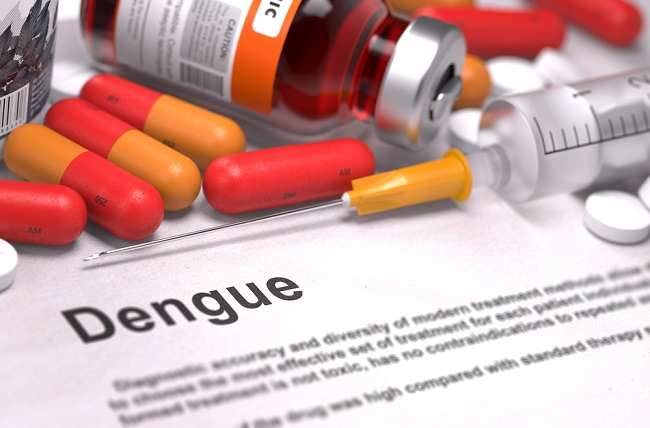Mercury poisoning is a condition when a person is exposed to mercury or mercury a certain amount, which in turn causes damage and disturbances to organs, such as the heart and brain. Mercury poisoning often occurs as a result of eating foods that contain mercury or menginhale mercury gas.
The most dangerous type of mercury is methyl mercury (organic mercury). The reason is, about 90% of the levels of methyl mercury that are ingested or enter the body will be absorbed into the blood. This figure is very large when compared to other types of mercury which are only absorbed 2–10% into the blood.

When it enters the body, mercury can cause disturbances in many body systems, such as the nervous system, digestive system, immune system, and also organs, such as the lungs, kidneys, eyes, and skin.
Methyl mercury is often found in seafood, such as fish and shellfish that come from contaminated waters. The amount of methyl mercury contained in the body of fish varies, depending on its position in the food chain.
Some types of fish with a high position in the food chain, such as mackerel, shark, tuna, swordfish, and marlin, have the potential to store high amounts of mercury.
Causes of Mercury Poisoning
Mercury is a metallic element that occurs naturally in soil, water and air. These compounds can also be found in everyday products, such as food products, but generally in harmless amounts. However, the amount of mercury in the environment is increasing due to the rapid industrial development.
Mercury itself is divided into 3 types, namely:
Elemental mercury or liquid mercury (Mercury)
This type of mercury is usually found in thermometer tubes, electrical switches, fluorescent lamps, dental fillings, and some medical equipment. Elemental mercury can be hazardous if it becomes a vapor or gas and is inhaled by humans.
Organic Mercury
Organic mercury can be found in fish and coal burning smoke. This type of mercury can be harmful to people who are exposed to it for a long time, either through ingestion, inhalation, or in contact with the skin.
inorganic mercury
This type of mercury is found in batteries, chemical laboratories, and some disinfectants, and is dangerous if swallowed.
Mercury poisoning can occur as a result of periodic exposure to mercury over a long period of time (chronic) with small amounts of mercury, or suddenly (acutely) with large amounts of mercury. The following are some of the factors that can cause mercury poisoning:
- Eating fish contaminated with mercury
- Breathing mercury-contaminated air due to industrial processes, such as smoke from burning coal, burning fuel oil, and burning wood
- Inhaling mercury vapor while heating gold ore in gold mines
- Using a skin lightening cream that contains mercury
- Inhaling the smoke of an erupting volcano or forest fires
- Inhaling mercury vapor when the fluorescent lamp breaks
- Inhaling mercury vapor when the mercury thermometer breaks or swallowing mercury when the thermometer breaks in the mouth
Based on the causes above, people who eat fish too often, live or work near industrial areas that use mercury, such as mining, are at high risk of mercury poisoning.
PCauses of Mercury Poisoning
A person can get mercury poisoning under several different circumstances, such as:
- Eating fish contaminated with mercury.
- Inhalation of smoke from volcanic eruptions or forest fires.
- Breathing polluted air due to industrial processes, such as smoke from burning coal, burning fuel oil, and burning wood
- Dental fillings containing amalgam can release mercury, which can be inhaled or swallowed.
- Inhalation of mercury vapor when fluorescent lamps break.
- Inhalation of mercury vapor when a mercury thermometer breaks or ingestion of mercury when the thermometer breaks in the mouth.
- Inhaled mercury vapor when heating gold ore in gold mining.
- Use skin lightening creams that contain mercury.
Symptoms of Mercury Poisoning
Symptoms of mercury poisoning can vary widely. This depends on the type of mercury that enters the body, the method of entry, the amount of mercury entered, the length of exposure, the age of the person exposed, and the general health condition of the person.
Mercury will damage the nervous system, digestive tract, and kidneys and cause heart, lung, immune system, eyes, and skin disorders. Based on the organs affected, the following are symptoms of mercury poisoning:
Nervous system
Mercury poisoning will cause damage to the nervous system. Some of the complaints and symptoms that can arise are:
- Headache
- Tremor
- Tingling, especially around the hands and feet, and mouth
- Visual disturbances, such as tunnel vision and blindness
- Speech and hearing disorders
- Impaired coordination and movement, including ataxia
- Impaired emotional and cognitive function
- Muscle weakness
- Difficult to walk
- Memory loss
Kidney
Mercury poisoning can cause kidney failure. This condition can be recognized by the appearance of symptoms in the form of a little urine, continuous nausea, shortness of breath for which the cause is not clear, and the body feels very weak.
In addition to the nervous system and kidneys, several other organs that can be affected by mercury poisoning are as follows:
- Heart, mercury poisoning can cause chest pain and cardiomyopathy
- Lungs and respiratory tract, inhalation of mercury can cause sore throat, if exposed in large quantities can even cause respiratory failure
- Eyes, when exposed to mercury, eyes can experience irritation and impaired peripheral vision
- Skin, mercury poisoning can lead to the appearance of skin lesions, such as papule rash
Mercury exposure during pregnancy can also cause developmental disorders in the fetus. As a result, children can experience impaired cognitive function, memory problems, impaired concentration of attention, and other developmental disorders, such as speech, motor, and vision.
When to go to the doctor
Check with your doctor as soon as possible if you are concerned about mercury poisoning, especially if the symptoms listed above occur.
Seek immediate medical attention if you or someone around you experiences any of the following conditions:
- Ingesting mercury intentionally or unintentionally
- Inhaling mercury vapor or gas and experiencing respiratory distress
Mercury Poisoning Diagnosis
To diagnose mercury poisoning, the doctor will ask about the patient's symptoms, medical history, diet, and occupation, or the person who brings the patient.
After that, the doctor will perform a thorough examination, including a neurological examination. In order to make the diagnosis more accurate, the doctor will perform several supporting tests, such as:
- Blood or urine tests, to measure mercury levels in the body
- Stool examination, to determine whether there has been bleeding in the digestive tract
- MRI, to determine the degree of atrophy (cell loss) in the brain
- X-rays, to detect the presence of mercury that has entered and spread in the body
Mercury Poisoning Treatment
There is no specific treatment that can be used to treat mercury poisoning. The best effort that can be done is to immediately stop exposure to mercury and provide treatment as early as possible.
The first treatment for mercury poisoning patients is to remove the patient from the source of exposure. Then, avoid other people making contact with the patient. If possible, remove the patient's clothing that is contaminated with mercury.
If the patient inhales large amounts of mercury, the patient needs to be treated immediately by a doctor. The doctor will confirm the airway (airway), the process of breathing (breathing), and the patient's circulation or blood flow is safe.
Installation of breathing apparatus, such as intubation and infusion will also be carried out in the initial treatment. If there is respiratory or cardiac arrest, the doctor will perform cardiopulmonary resuscitation.
Patients who are poisoned by mercury due to ingestion of this substance are not advised to take drugs that stimulate vomiting. This is because vomiting can increase the risk of healthy tissue being exposed to mercury.
In the case of chronic mercury poisoning, the source of mercury must be identified and immediately so as not to cause further exposure.
If acute mercury poisoning occurs as a result of the patient ingesting mercury, the doctor will perform a gastric lavage or rinse. This procedure is done by inserting a special tube from the nose that is connected to the stomach, to wash the stomach and remove all the contents of the stomach.
To bind toxins that may still be in the digestive tract, doctors can also give activated charcoal. This is usually done if poisoning has recently occurred.
If there is an increase in mercury levels in the blood or urine, chelation therapy is necessary as an initial step. Chelation therapy is a drug therapy that functions to remove metals from the blood. Some of the drugs commonly given in this therapy are: dimercapol (BAL) or succimer (DMSA).
Meanwhile, in patients who already have impaired kidney function, dialysis procedures may need to be performed.
Complications of Mercury Poisoning
Mercury poisoning due to exposure to large enough amounts of mercury or due to slow treatment can lead to several serious complications, such as:
- Permanent lung damage
- Brain damage
- Extreme dehydration and bleeding
- Kidney failure
Mercury Poisoning Prevention
You can prevent mercury poisoning by avoiding the things that cause this condition, such as:
- Limiting the consumption of seafood that has the potential to have high mercury levels
- Provide fish consumption to children in accordance with recommended health standards, namely children aged less than 3 years can consume 1 ounce of fish/day, while for children aged 4-7 years, the recommended portion of fish is 2 ounces/day
- Avoid consuming seafood with high mercury levels while pregnant
- Avoid activities that have a high risk of causing mercury exposure, such as cooking with firewood indoors or in rooms with poor ventilation
- Immediately wash your hands or take a shower if you feel you have been exposed to mercury
- Take care when disposing of products containing mercury or when cleaning them in the event of a mercury leak or spill
Things to consider when cleaning a room exposed to mercury include:
- Do not use a vacuum cleaner or broom to remove mercury.
- Do not touch mercury without wearing protection.
- Do not throw mercury into drains.
- Dispose of clothing contaminated with mercury in a closed bag.
- Do not place bags containing mercury-contaminated items in the household trash.









